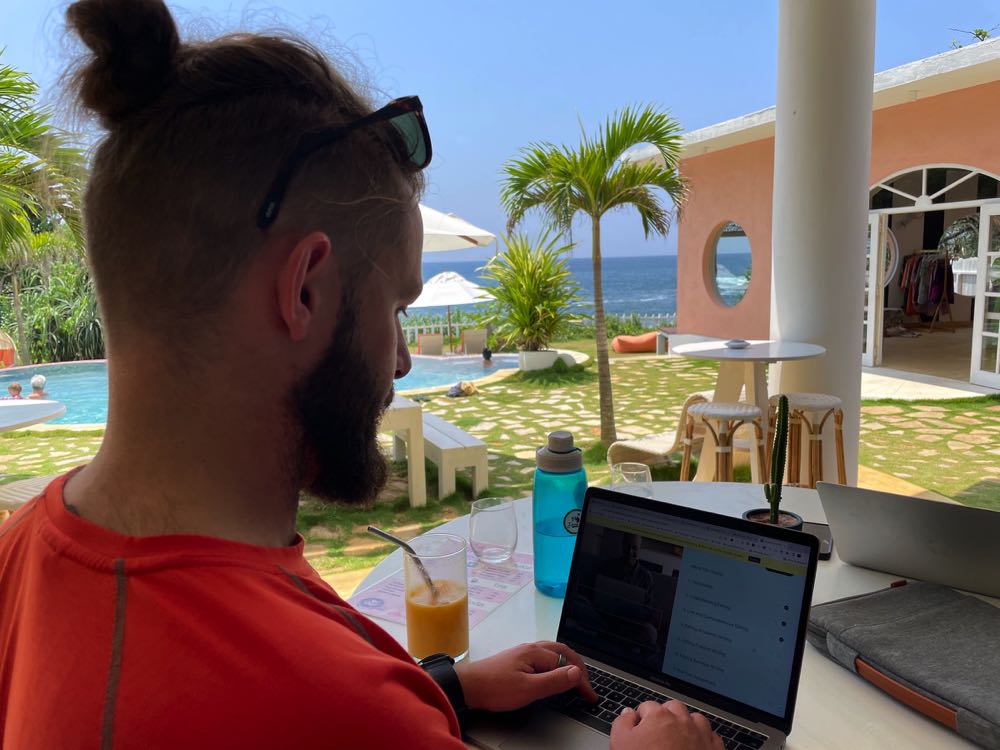Notifications
ALL BUSINESS
COMIDA
DIRECTORIES
ENTERTAINMENT
FINER THINGS
HEALTH
MARKETPLACE
MEMBER's ONLY
MONEY MATTER$
MOTIVATIONAL
NEWS & WEATHER
TECHNOLOGIA
TV NETWORKS
VIDEOS
VOTE USA 2026/2028
INVESTOR RELATIONS
COMING 2026 / 2027
ALL BUSINESS
COMIDA
DIRECTORIES
ENTERTAINMENT
FINER THINGS
HEALTH
MARKETPLACE
MEMBER's ONLY
MONEY MATTER$
MOTIVATIONAL
NEWS & WEATHER
TECHNOLOGIA
TV NETWORKS
VIDEOS
VOTE USA 2026/2028
INVESTOR RELATIONS
COMING 2026 / 2027
About Me
 Latinos Media
Latinos Media Latinos Media provides all types of news feeds on a daily basis to our Members
Posted by - Latinos Media -
on - May 2, 2023 -
Filed in - Travel -
-
687 Views - 0 Comments - 0 Likes - 0 Reviews

If you’re wondering how to become a digital nomad, or whether you should give the lifestyle a try, you’ve come to the right place. I’m a full-time digital nomad and have put together this honest, comprehensive guide to help you decide what’s best for you and learn more about your options.
It’s hard to ignore the buzz around digital nomadism these days. In the last few years, and especially post-pandemic, it’s become an increasingly popular lifestyle choice. But how do you become a digital nomad and what does it entail?
I chose to take the leap at the beginning of 2022, and it was honestly one of the best decisions I’ve ever made. Since then I’ve lived and worked in several different places around the world including Mexico, Costa Rica, Albania, Montenegro, Sri Lanka, and the UK.
There are definitely a few downsides to being a digital nomad (which I’ll be discussing below) but, for me, the pros – especially the freedom it provides – vastly outweigh the cons.
Within this post, I’ll also be giving you lots of practical tips to help you on your journey to location independence.
What is a Digital Nomad?Essentially, a digital nomad is anybody who is able to earn money remotely on their laptop (hence, “digital”) and isn’t tied to any particular place by their work. This usually means that they have the freedom to travel whenever and wherever they want (hence, “nomad”).
Many digital nomads tend to work in tech, web design, computer programming, graphic design, blogging, or copywriting because these jobs are ideally suited to remote working. For many of these jobs, all that’s needed is a laptop and a stable internet connection, and you’re good to go.

Being able to travel at will and work from anywhere is sometimes also called “location independence” – which I particularly like, and use a lot. Because of this location independence, many digital nomads choose to spend a significant amount of time traveling abroad.
However, just because you are location independent doesn’t mean that you need to be traveling all of the time.
Personally, traveling is one of my favorite things to do. But that doesn’t mean that I want to (or could) be doing it all year round. The key point is that the digital nomad lifestyle allows you the freedom to travel whenever you want to.
It’s up to you to decide how much time you actually want to be moving around. Plenty of digital nomads only travel for part of the year, and choose to spend the rest of their time in a home base somewhere that may, or may not, be where they’re originally from.
Pros and Cons of Becoming a Digital NomadLiving in paradise, surfing or hiking in the morning, working for a few hours, taking a break for a refreshing dip in the sea, doing a little more work, and ending the afternoon enjoying a tropical sunset with an ice-cold beer, feeling good about your life choices… Sounds pretty awesome, right?
It’s true, being a digital nomad is awesome – that’s why I’m doing it right now! But it’s not all roses. As well as the (numerous) pros to the lifestyle, there are definite cons to this way of living too.

Here are some of the amazing benefits of becoming a digital nomad:
Of course, there are a few downsides though. To make this post as honest, balanced, and useful as possible, I’ve also included a list of the disadvantages of becoming a digital nomad.
These are based on my personal experience, so keep in mind that not all of these may apply to you:
Okay, so now you’ve decided that you want to take the plunge and try out a location-independent lifestyle. Awesome. The next question you’ll probably have is: How do I become a digital nomad?
There are so many different ways to become a digital nomad, and everybody’s circumstances are different.
I used to be a corporate lawyer in London; I hated the lifestyle and wanted nothing more than to be able to travel and work from anywhere. I knew that I needed to find a way to earn money remotely, but it took me a couple of years to figure out exactly what it was that I wanted to do.
 I used to work in a corporate office, now my office is a poolside table in the tropics!
I used to work in a corporate office, now my office is a poolside table in the tropics!
However, there are a few certain steps that I’d recommend taking to help support you with the greatest chance of finding success as a digital nomad. Use these steps to becoming a digital nomad as a starting point, and tailor them to your individual situation:
Step 1: Figure Out Whether You Actually Want To Be a Digital NomadThis first step is extremely important, and one that not enough people spend enough time on. Before leaping into how to get started as a digital nomad, I highly recommend taking a bit of time to think about whether the decision is truly likely to be a good one for you, personally.
Honestly, it’s one of the biggest lifestyle shifts you could make. It will entirely change your life. So, you should go into the decision with open eyes to help ensure that it changes your life for the better.
Read as much as you can about what it’s like to be a digital nomadCongratulations – you’re taking the first step right now! I recommend reading as much as possible about what it’s actually like to be a digital nomad. And it’s essential that these guides are written by people who are actually doing it themselves.
There are many guides on how to become a successful digital nomad online. Some of these are better than others, but the more you read the more you’ll understand what it’s really like to be a digital nomad. You need this information to help you decide whether it’s right for you or not.
Ask yourself some hard questionsAs I mentioned above, while there’s no doubt that being a digital nomad is incredible, the lifestyle definitely does come with some fairly significant downsides. You need to be very honest with yourself and ask yourself whether these downsides would be worth accepting for you.
For me, the upsides are definitely worth the downsides, 100 times over. But everybody’s different. I’ve met a few digital nomads who clearly weren’t happy with their lifestyle and who were actually planning to go back home and “get a normal job” again.
Here are a few questions that I’d recommend asking yourself. Be as honest with yourself as you can when thinking about them:
I’m not trying to discourage you from pursuing the digital nomad dream. It’s the best decision I ever made and I wouldn’t have it any other way, but you should think carefully about what you actually want before making the jump.
Step 2: Figure Out How You Can Earn Money RemotelyThe next step is to identify the skills you already have that lend themselves well to working remotely. Do some research about job requirements for different positions and see if any of them align with what you can already do.
For example, if you’re a web designer, there are plenty of jobs available that can be done remotely. Or, if you have experience in customer service or writing, those skills could easily be put to use somewhere too.
Depending on the skills you have, there are plenty of options for both freelancers and people who want to start their own business.
Freelancing vs. starting an online businessConsider whether you want to work freelance or whether you’d prefer to start your own business as a way to make money while working remotely. There’s nothing stopping you from contemplating a bit of both either.
I’m currently working on building up my blog (Just Go Exploring) to the point where it can sustain me full-time. At the same time, I’m also working a few different freelance jobs.
It can be a little tricky to balance all of these commitments at times, but it’s good to have diversified sources of income, especially when you’re starting out.
How to become a freelance digital nomad: Ideas for freelance workWhen it comes to freelance work, you have lots of options. These include:
The list is almost endless!
Business ideasLikewise, there’s a practically infinite number of different online businesses that you could start and run from wherever you choose to be.
Here are a few ideas:
The possibilities are pretty much endless…
Step 3: Save As Much Money As You CanIt’s no fun having to worry about money while also trying to create a new lifestyle for yourself.

Before you throw yourself into this way of living, I strongly recommend making sure that you’re starting from a solid financial foundation. There will inevitably be bumps in the road along the way, with unexpected costs and delays, and you don’t want to risk running out of cash.
This is especially true if you want to start your own business. Most small businesses take at least 2-3 years to turn a profit. I saved up for about 12 months before taking the plunge as I knew that I would need a good amount of runway before my business started earning me anything at all.
You don’t necessarily need to wait as long as this, especially if you already have some strong ideas of how to work as a digital nomad freelancer. But at a minimum, I’d recommend saving as much as you can, consistently, for at least 6 months on your current salary before taking the leap.
Create a budgetCreating a budget is an essential step when preparing to become a digital nomad. Assess your income and expenses, determine what you can realistically afford to spend (and save), and track your progress along the way.
There are plenty of financial apps and tools that can help you with this process. Try setting up a few different accounts to see which works best for you.
Remember to factor in any taxes that you’ll have to pay on your income. It’s usually a good idea to speak with a tax advisor or accountant to help you figure out what you need to pay, and what records you need to keep. These vary depending on your nationality and where you’ll be living.
Cut unnecessary expensesTry to cut out any unnecessary expenses that might get in the way of you reaching your savings goals. Anything from expensive phone contracts to fancy gym memberships and pricey meals out – it’s a good idea to make savings wherever you can.
However, of course, you should still leave yourself enough money to enjoy yourself from time to time. Don’t become unnecessarily miserable; just try to avoid wasting money while you put savings aside.
Rather than going on an expensive foreign holiday, why not opt for a cheaper (but equally fun) camping or hiking trip closer to home? Remember, you’ll be able to travel as much as you want once the earnings from your new digital nomad job(s) start to roll in!
Think carefully before making any major purchases. I have a rule whenever buying something new that costs over $50: I wait at least 48 hours from the time I decide I “need” it to the time that I actually buy it. If I’m still convinced that it’s a necessary purchase after that time, I go ahead.
Sell some of your stuffChances are that, when you head off on your digital nomad adventure, you’ll need to either leave some of your personal possessions with family members or pay to put your things in storage.
This is a great opportunity to evaluate which of your belongings are actually important to you and which possessions you wouldn’t mind being free of. There’s no point paying to store stuff that you won’t need or even want in the future.
Consider selling anything that doesn’t make the cut. You can use sites like Facebook Marketplace, eBay or Craigslist or even host a garage sale to get rid of things and give your savings pot a beneficial boost. Charity shops are great places to get rid of things too.
Build up an emergency fundYou’ll definitely want to have an emergency fund to ensure you’re prepared for anything unexpected that might come up during your travels. This should be enough to cover emergency flights home (e.g. to see sick relatives), and any unforeseen medical expenses that travel insurance won’t take care of.
There’s no hard-and-fast rule for how much you should have in this emergency fund. I like to have at least a couple thousand dollars stashed away, (in an account that I promise myself not to touch). This is generally enough money to get a last-minute flight back home from wherever I am in the world, at any given time.
Of course, the bigger your emergency fund, the better. But the right amount for you will depend on your individual circumstances.
Step 4: Invest In YourselfDepending on the area that you want to work in, and your previous level of experience and knowledge, it can also pay to spend a little bit of money to build up relevant knowledge, skills, and know-how.
This can really help you figure out how to be a digital nomad and increase your chances of finding good-quality, reliable work.
For example, you could buy a couple of books by authority writers on the field you want to work in. Or, invest in a highly-reviewed online course to help you grow your skillset and set yourself up for success in your chosen area.
Online coursesWhen I decided that I wanted to be a travel blogger, I had no idea about anything to do with blogging, web design, SEO, or anything like that. But I knew that mastering these areas would be key to success in my new career.
I bought Goats On The Road’s Complete SEO Course which taught me a lot of all I now know about blogging and SEO. Had I not taken this course, I wouldn’t be where I am today with my blog.
Examples of courses that you can takeThere are online courses on practically every topic nowadays, including: